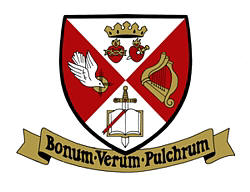The following is an excerpt from a talk given by our headmaster, Sean Fitzpatrick, during the banquet for St. Gregory’s feast day on March 12th, 2014.
Today is the Feast Day of Gregory the Great, patron of this school and of this community. There are many reasons why St. Gregory is our patron saint. His life reflected many of the ideals that direct our vision: fidelity to the Holy See, orthodoxy in doctrine, attachment to the traditional liturgy and sacred music, the preservation of classical education, and the list goes on. But there are reasons for his patronage that are harder to pinpoint because they are more mysterious – reasons rooted in the very reason why Gregory is a saint.
For instance, though Gregory was pope, and a great pope, he was first and foremost a monk. He was a monk even as pope, dedicated to an ascetic life and to the vibrant life of his community—the community of the Universal Church. He left a promising political career as the Prefect of Rome to become a monk—to embrace a simpler life, a life focused on God, community, and study. We live a quasi-monastic life here and Gregory was fully a monk, making him a good abbot for us as he was for so many.
Another important reason why we call on Gregory to be our saint is that our education is one founded upon a dynamic love—a love and energy for things good, true, and beautiful. St. Gregory was positively animated by a dynamic love that we can only hope to imitate—a dynamic love that was focused entirely on the desire for God. And it is upon this desire that we model our education.
Jean Leclerq, a Benedictine monk and theologian, once called St. Gregory the “Doctor of Desire.” The Doctor of Desire. What a surprising title for a Saint and a Pope, you might think. The Doctor of Desire. Or you could say, the Doctor of Love, or even the Love Doctor. Why would someone refer to Saint Gregory with this surprising title? The title refers to Gregory’s philosophy that asceticism was a preparation for the desire for God: a training, or cultivation, of desire. Through prayerful meditation on Sacred Scripture, desire for God is sown in the heart under the guidance of the Holy Spirit. The Holy Spirit inspires our best thoughts, brings understanding, and enkindles and guides our deepest and most inward longings. At the touch of the Holy Spirit the heart leaps up in yearning for God. Gregory speaks of this experience as a colloquy or a conversation between God and man. A conversation that begins with God’s word inflaming the desire of the heart, a gentle word that one must wait for, listen for.
There is a passage in the Book of Job that echoes Elijah’s famous experience where he searches for the Lord in a hurricane, in an earthquake, and in a fire, but only finds him in a gentle breeze. Job reads, “There stood one whose countenance I knew not, an image before my eyes, and I heard the voice, as it were, of a gentle wind.” In this, this murmur, this hidden word, Gregory hears the opening of a lovers’ dialogue. “This inspiration touches the human mind,” he writes, “and by touching lifts it up and represses temporal thoughts, inflaming it with eternal desires… so that to hear the hidden word is to conceive the speech of the Holy Spirit in the heart.”
The cultivation of desire or the cultivation of the virtues of the heart that Gregory speaks of is the very essence of education. Generally speaking, people will only do well if they have a will—a wanting, a desire—to do the thing at hand. Consequently, education that does not engage the heart fails. True education is an erotic endeavor—an attempt to awaken desire and the longing for ultimate consummation. If wisdom is a beautiful woman, as we learn from Proverbs, then love must not only play a part, it must lead the way in guiding a youth to his proper fulfillment.
I would like to share a passage with you by Mr. Brendan Landell, one of our alumni and foremost thinkers:
The burden of true education, of education that truly “leads out,” begins with desire. The roaring of Irish songs is far different from the chanting of Vespers. But the reality encountered in the former springs from the same source as the latter, and possesses an additional perk: its appeal is more immediate to a young man exploding with energy and passion. At St. Gregory’s, he hears Vespers also, within the background of a spiritual life during which he prays and often receives the Sacraments daily. If he wants nothing good in his life, he can never be expected to want the best, if he loves nothing, he can never be expected to love Wisdom and Her Maker. Furthermore, somewhere within that song, lurks another, a person wooing them, a bridge to another world, a world in which God dwells and is more visible.
Gentlemen of Gregory the Great, there stands before you one whose countenance you do not yet fully know. An image before you eyes. Hear the voice, hear the gentle wind. It whispers to you in your songs, in your books, in your play, and in your friendships. It is the voice of God calling you through the things of this world to the desire for him. Let us go gaily in the dark, our desire for Him as sharp as swords and as bright as song. Gregory the Great pray for us!
